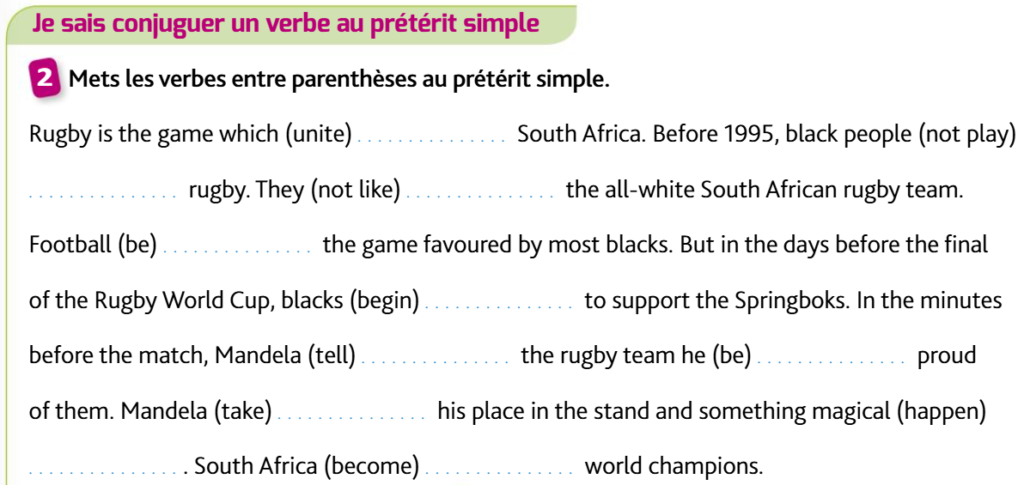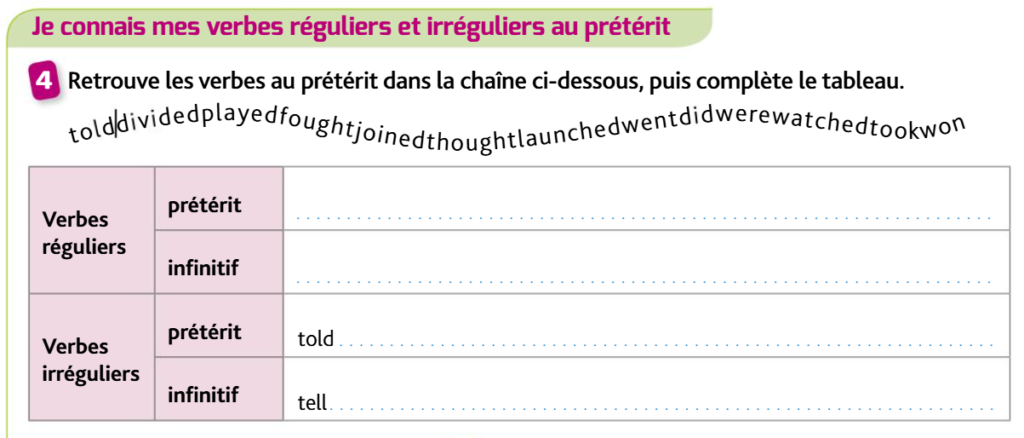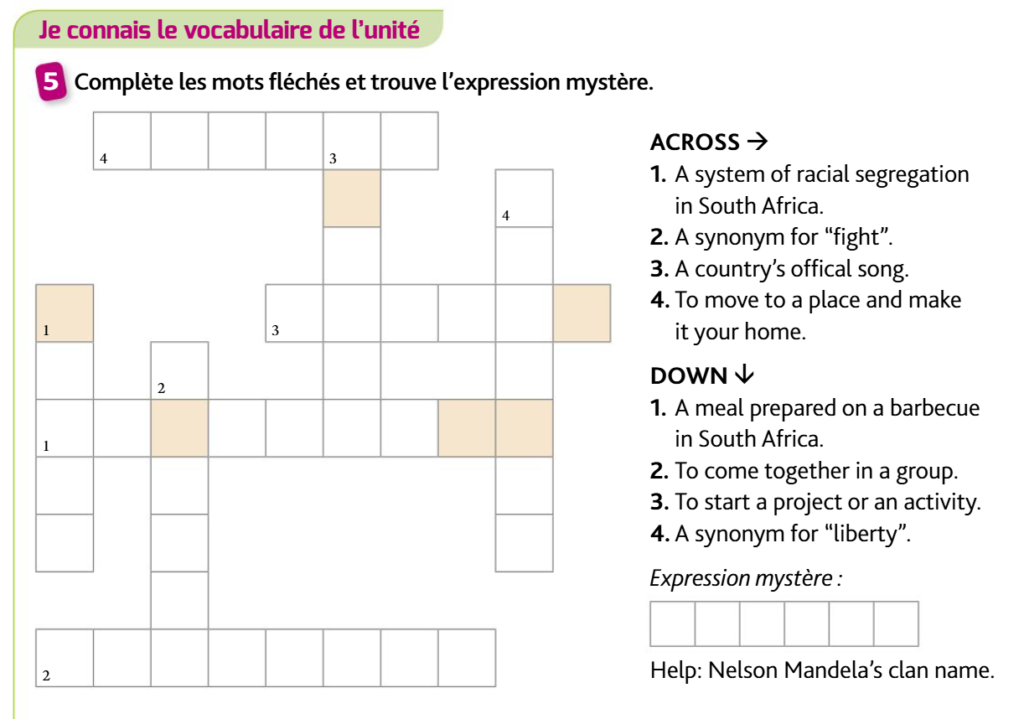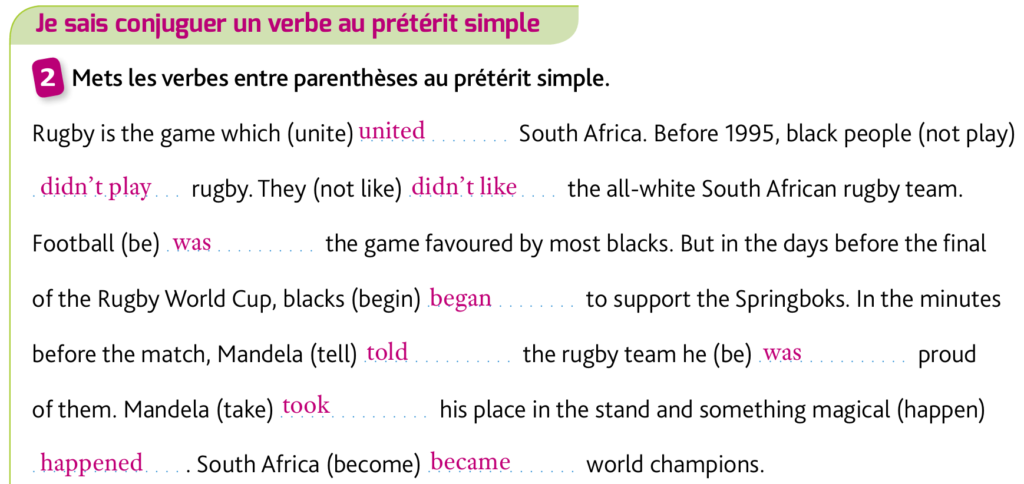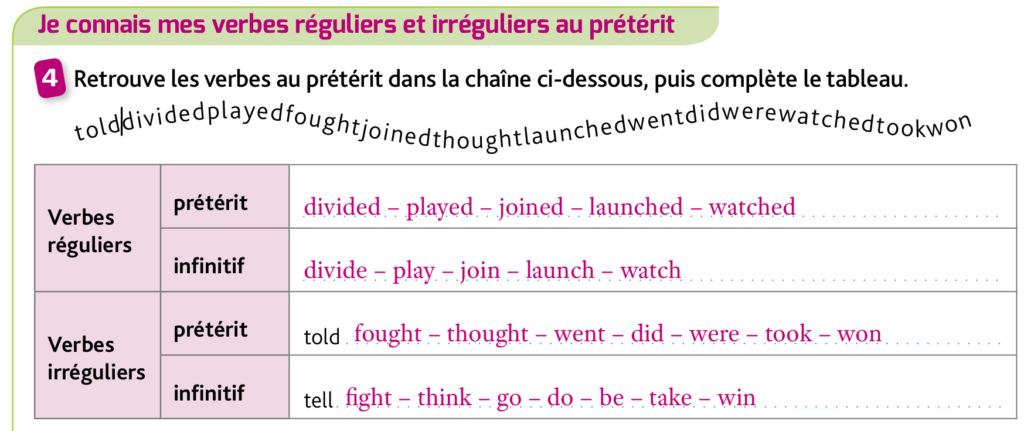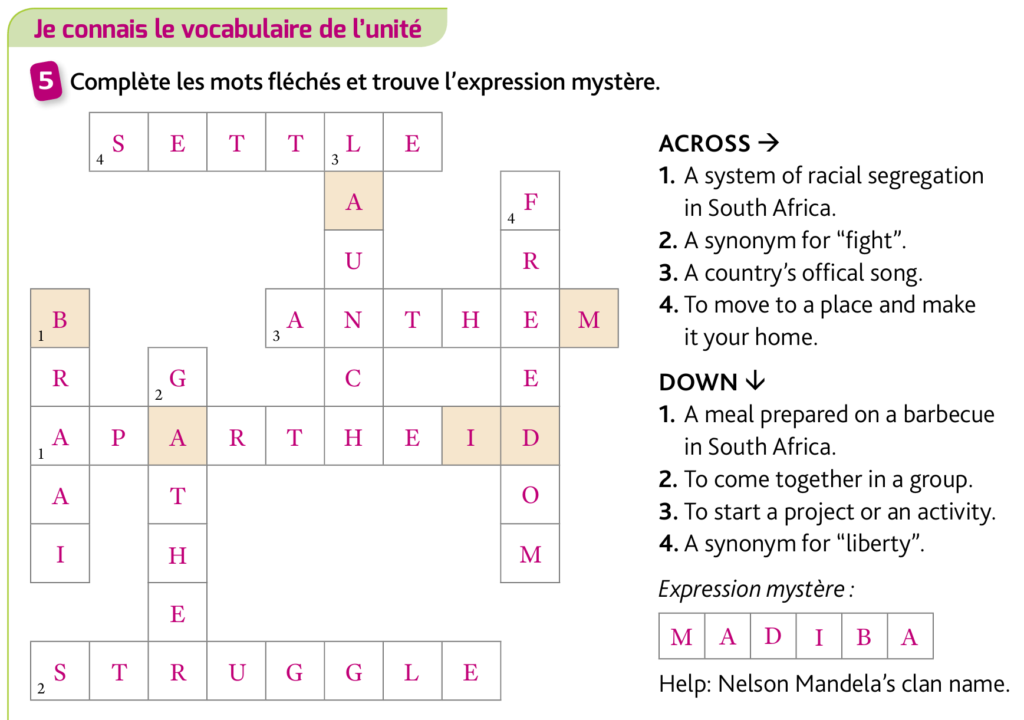Practice Makes Perfect
Objectifs
- le prétérit simple
- approfondir la façon de prononcer la terminaison -ed
- le vocabulaire autour de la culture sud-africaine
- poser des questions au présent et au prétérit
- apprendre à bien respecter l’intonation des questions
- le lexique de l’activisme politique
Contents
Le prétérit simple
- Rappel : créer des phrases au prétérit (past simple)
- Liste des verbes irréguliers et explication
- Phrases affirmatives et négatives
- Conjuguer les verbes au prétérit
- Mélodique : prononciation de la terminaison -ed
Grammar Kit
Le prétérit simple est utilisé pour parler d’actions passées terminées.
| Forme | Verbes réguliers | Verbes irréguliers | Verbe « be » |
|---|---|---|---|
| Affirmative (+) | V-ed | Voir la fiche | I / he / she / it was you / we / they were |
| Négative (-) | didn’t + BV | didn’t + BV | I / he / she / it wasn’t you / we / they weren’t |
Révisez vos verbes irréguliers, un test aura lieu bientôt!
1. Recopie et complète le tableau.
| Base verbale | Prétérit |
|---|---|
| wear | |
| say | |
| did | |
| made | |
| buy | |
| got |
| Base verbale | Prétérit |
|---|---|
| wear | wore |
| say | said |
| do | did |
| make | made |
| buy | bought |
| get | got |
2. Corrige les phrases suivantes en les réécrivant à la forme négative.
- a. People celebrated Heritage Day before 1995.
- b. South Africa became independent in 1994.
- c. In the 20th century, Robben Island was a museum.
- d. In the 1960s, resistance movements began in Pretoria.
- e. A few years ago, people had a braai on Heritage Day.
- a. People did not celebrate Heritage Day before 1995.
- b. South Africa did not become independent in 1994.
- c. In the 20th century, Robben Island was not a museum.
- d. In the 1960s, resistance movements did not begin in Pretoria.
- e. A few years ago, people did not have a braai on Heritage Day.
3. Un adolescent sud-africain raconte comment il a fêté Heritage Day avec sa famille.
Mets les verbes entre parenthèses au prétérit simple.
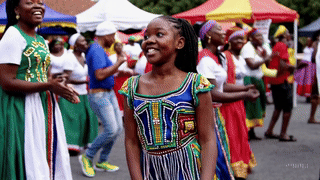
Last week, as usual, Heritage Day (1-be) a big day of celebrations and a lot of people (2-join) the festivities. I (3-have) a lot of fun.
All the women (4-put) on traditional outfits and (5-dance) to traditional music. Everybody (6-laugh) and (7-clap) as the dancing (8-become) jovial. We also (9-eat) traditional food like mopane worms and (10-sing) songs. And there (11-be) different games and competitions. My sister and her friends (12-win) the Zulu dance competition.
Last week, as usual, Heritage Day was a big day of celebrations and a lot of people joined the festivities. I had a lot of fun.
All the women put on traditional outfits and danced to traditional music. Everybody laughed and clapped as the dancing became jovial. We also ate traditional food like mopane worms and sang songs. And there were different games and competitions. My sister and her friends won the Zulu dance competition.
Melody Time
La terminaison -ed des verbes réguliers au prétérit simple mais aussi de certains adjectifs et participes passés peut se prononcer /id/, /t/ ou /d/. Lis le texte suivant en faisant attention à bien prononcer la terminaison -ed.
When Jan Scannell started the Braai initiative, he never imagined it would become so popular. “I phoned Desmond Tutu and explained that I wanted to unite 50 million people around braai fires. He liked the idea, so we started talking about getting him involved as the patron,” Scannell said. In 2009, the initiative launched an official anthem Our Heritage, recorded by several South African artists.
Vocabulaire 1
- le vocabulaire autour de la culture sud-africaine
- Définitions : retrouver le mot à partir de sa définition
- Utilisation du vocabulaire : compléter des phrases
- Compréhension d’image : décrire l’image
Words to Remember – Traduction
Copiez la liste des mots ci-dessous et écrivez leur traduction en français.
Noms
|
|
Verbes
|
|
Adjectifs
- Cultural
- Indigenous
- Traditional
- United
Noms
|
|
Verbes
|
|
Adjectifs
- Cultural = culturel
- Indigenous = indigène
- Traditional = traditionnel
- United = uni
1. Trouve les mots correspondant aux définitions suivantes.
- a. A country’s official song.
- b. To come together in a group.
- c. A meal prepared on a barbecue in South Africa.
- d. A language that is spoken in South Africa.
Réponses – Exercice 1
- a. Anthem
- b. Gather
- c. Braai
- d. Afrikaans
2. Complète les phrases suivantes par un des mots du Words to Remember.
- a. The first Europeans _______ in South Africa in the 15th century.
- b. South Africa is often called the _______ Nation.
- c. On Heritage Day, women often wear traditional _______.
- d. Items sold at South African _______ markets can range from traditional beaded necklaces and clay pots to eco-friendly bags.
- e. There are 11 official _______ spoken in South Africa.
Réponses – Exercice 2
- a. The first Europeans settled in South Africa in the 15th century.
- b. South Africa is often called the Rainbow Nation.
- c. On Heritage Day, women often wear traditional outfits.
- d. Items sold at South African craft markets can range from traditional beaded necklaces and clay pots to eco-friendly bags.
- e. There are 11 official languages spoken in South Africa.
3. Vocabulary challenge
Choisis un mot du Words to Remember et demande à ton/ta camarade de l’épeler, à l’endroit ou à l’envers.
4. Trouve au moins cinq mots du Words to Remember que tu peux utiliser pour parler de le gif suivante.
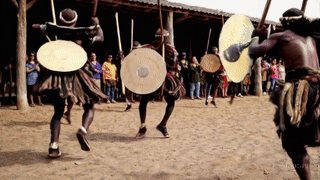
Les questions au présent et prétérit simple
- Former des questions au passé simple
- Mots interrogatifs
- Retrouver les questions à partir des réponses
Grammar Kit
Les questions au présent et au prétérit simple se forment de la manière suivante :
| Type de question | Formation | Exemple |
|---|---|---|
| Avec « be« | (Mot interrogatif +) « be » conjugué + sujet (+ compléments ?) | How long was he president? |
| Autres verbes | (Mot interrogatif +) auxiliaire (« do »/ »did ») + sujet + BV (+ compléments ?) | Did they win the Rugby World Cup? |
| Sans sujet | Mot interrogatif + verbe conjugué + complément ? | What happened in 1960? |
1. Associe chaque question à la réponse correspondante.
- a. When did they win the World Cup?
- b. Was he still in prison in 1993?
- c. Did Morgan Freeman meet Nelson Mandela?
- d. How old was Mandela when he died?
- 1. Yes, he did.
- 2. 95.
- 3. In 1995.
- 4. Yes, he was.
Réponses – Exercice 1
- a. 3
- b. 4
- c. 1
- d. 2
2. Complète avec le(s) mot(s) interrogatif(s) qui convien(nen)t.
- a. _______ was he born? In a village in Cape province.
- b. _______ sport did black people play under apartheid? Football.
- c. _______ children did he have? Six.
- d. _______ did he go to prison? Because he was accused of sabotage.
- e. _______ was he when he won the election? 77.
- f. _______ did apartheid last? More than 40 years.
- g. _______ suffered from apartheid? Black people.
- a. Where was he born?
- b. What sport did black people play under apartheid?
- c. How many children did he have?
- d. Why did he go to prison?
- e. How old was he when he won the election?
- f. How long did apartheid last?
- g. Who suffered from apartheid?
3. Rédige les questions sur le rôle de Mandela en Afrique du Sud.
Utilise les éléments suivants :
- a. why / Nelson Mandela / be / national hero?
- b. how / you / react / when he got elected?
- c. what / he / do / for black people?
- d. how / he / manage to unite the country?
- a. Why was Nelson Mandela a national hero?
- b. How did you react when he got elected?
- c. What did he do for black people?
- d. How did he manage to unite the country?
4. Pour chaque phrase, retrouve la question qui a été posée.
- a. François Pienaar was the captain of the Springboks.
- b. Morgan Freeman played Nelson Mandela in Invictus.
- c. Nelson Mandela received the Nobel Peace Prize in 1993.
- d. The police killed 69 protesters in Sharpeville.
- e. He was president for 5 years.
- a. Who was the captain of the Springboks?
- b. Who did Morgan Freeman play in Invictus?
- c. When did Nelson Mandela receive the Nobel Peace Prize?
- d. How many protesters did the police kill in Sharpeville?
- e. How long was he president?
Vocabulaire 2
- le lexique de l’activisme politique
- Définitions : retrouver le mot à partir de sa définition
- Utilisation du vocabulaire : compléter des phrases
- Compréhension d’image : décrire l’image
Words to Remember – Traduction
Copiez la liste des mots ci-dessous et écrivez leur traduction en français.
Noms
|
|
Verbes
|
|
Adjectifs
- Divided ≠ United
- Separate
- True = Real
Words to Remember – Réponses
Noms
|
|
Verbes
|
|
Adjectifs
- Divided ≠ United = Divisé ≠ Uni
- Separate = Séparé
- True = Real = Vrai / Réel
1. Écris trois phrases contenant chacune un mot du Words to Remember.
Ensuite, efface ce mot pour faire des phrases « à trous ». Demande à ton/ta camarade de retrouver les mots manquants.
Réponses – Exercice 3 (Exemples de phrases)
- 1. Nelson Mandela fought for freedom.
- 2. The protesters marched in the streets against apartheid.
- 3. The country was divided during the apartheid era.
Version avec mots supprimés (« phrases à trous ») :
- 1. Nelson Mandela fought for _______.
- 2. The _______ marched in the streets against apartheid.
- 3. The country was _______ during the apartheid era.
2. Associe chaque gif au mot ou à l’expression du Words to Remember correspondant(e).
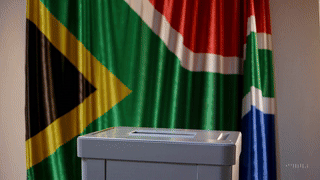
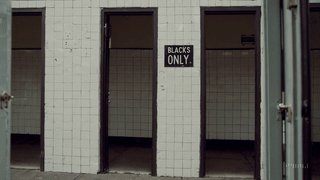
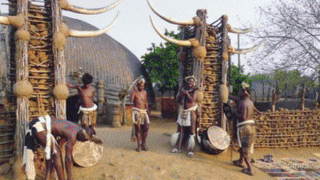
Réponses – Exercice 4
- Image 1: Election / leader / be elected / run
- Image 2: Divided / apartheid / separate
- Image 3: Tribe / clan
Worksheet
- Révision culturelle : Mandela et l’Apartheid
- Conjugaison au prétérit (past simple)
- Questions au prétérit
- Verbes réguliers et irréguliers
- Révision du vocabulaire
Complete the Worksheet

